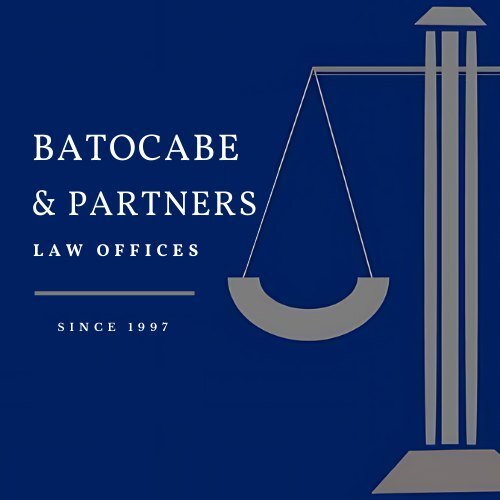Best Natural Resources Lawyers in Philippines
Share your needs with us, get contacted by law firms.
Free. Takes 2 min.
Or refine your search by selecting a city:
List of the best lawyers in Philippines

Dagsaan Monterde Castillo Law and Notary Public (DMC LAW)
15 minutes Free ConsultationAbout Natural Resources Law in Philippines
The Philippines is endowed with a variety of natural resources that play a pivotal role in its economy and development. Natural resources in the country include minerals, water resources, forests, marine life, and agricultural lands. The legal framework governing these resources is aimed at promoting sustainable development, ensuring fair utilization, and protecting the environment for future generations. The Constitution and various legislative acts form the basis of natural resources law in the Philippines, which outlines the management, conservation, and utilization of these resources.
Why You May Need a Lawyer
Legal advice may be necessary in various situations involving natural resources in the Philippines. Common scenarios include disputes over land ownership or resource use rights, compliance with environmental regulations, navigating the permit and licensing processes for extraction or exploitation of resources, defense against allegations of environmental harm, or when entering into joint ventures or contracts related to natural resources. Lawyers specializing in this field can help individuals, corporations, and communities understand their rights, negotiate agreements, and resolve disputes effectively.
Local Laws Overview
Key aspects of local laws pertinent to natural resources in the Philippines include the Philippine Mining Act for minerals, the Forestry Code for forest management, the Water Code of the Philippines for water resources, and the Agriculture and Fisheries Modernization Act which provides guidelines for agricultural lands and marine resources. The Environmental Impact Statement System is also crucial, as it requires project proponents to submit an Environmental Impact Assessment for projects likely to have significant environmental impact. These laws ensure sustainable resource usage and provide regulations that stakeholders must adhere to.
Frequently Asked Questions
1. What is an Environmental Compliance Certificate (ECC)?
An ECC is a document issued by the Department of Environment and Natural Resources (DENR) indicating that a proposed project will not cause significant negative environmental impact and is compliant with environmental regulations.
2. How can I acquire mining rights in the Philippines?
To acquire mining rights, one must apply for a permit with the Mines and Geosciences Bureau. This process involves compliance with the Philippine Mining Act, including the submission of all necessary documentation and an Environmental Impact Statement.
3. Are there laws protecting indigenous lands?
Yes, the Indigenous Peoples’ Rights Act protects the rights of indigenous communities over their ancestral domains. It ensures their rights to manage and utilize their resources according to their customs and traditions.
4. What are the regulations for fishing in Philippine waters?
The Fisheries Code outlines regulations for fishing activities, including licensing, protection of marine protected areas, and sustainable fishing practices to prevent overfishing and habitat destruction.
5. Can foreigners own natural resources in the Philippines?
In general, Philippine law restricts foreign ownership of natural resources. However, foreign entities can engage in resource exploration and utilization through joint ventures, service contracts, or agreements with Filipino corporations or the government.
6. What are the penalties for illegal logging?
Illegal logging is prohibited under the Forestry Code and is subject to severe penalties, including fines, imprisonment, and confiscation of illegally-logged timber. It aims to curb deforestation and conserve forest resources.
7. How do I resolve a land dispute regarding resource rights?
Land disputes can be resolved through negotiation, mediation, or legal action in court. Engaging a lawyer who specializes in land and natural resources can provide guidance and representation in such matters.
8. What is the process to get a water permit?
The Water Code mandates that individuals or entities must apply for a water permit for the appropriation and utilization of water resources. The application is submitted to the National Water Resources Board for evaluation and approval.
9. How does environmental law affect business operations?
Businesses must comply with various environmental regulations to avoid penalties, including obtaining necessary permits, adhering to pollution control measures, and conducting Environmental Impact Assessments for projects affecting natural resources.
10. What role do local governments play in natural resource management?
Local governments have a significant role in managing natural resources within their jurisdictions. They enforce national laws, implement local conservation and management plans, issue permits, and oversee compliance with environmental laws.
Additional Resources
For further assistance, individuals can contact key organizations such as the Department of Environment and Natural Resources (DENR) for environmental and resource management policies, the Mines and Geosciences Bureau for mining concerns, and the National Water Resources Board for water resources issues. Non-governmental organizations like Haribon Foundation and the Philippine Environment Partnership, Inc. offer additional support and advocacy.
Next Steps
If you need legal assistance in natural resources, consider consulting with a lawyer who specializes in environmental and natural resource law. Start by researching attorneys or firms with expertise in this area. Prepare necessary documents related to your issue and schedule a consultation to discuss your needs and how they can assist you. Lawyers can offer critical insights, assist with compliance and documentation, and represent you in negotiations or legal proceedings to protect your rights and interests.
Lawzana helps you find the best lawyers and law firms in Philippines through a curated and pre-screened list of qualified legal professionals. Our platform offers rankings and detailed profiles of attorneys and law firms, allowing you to compare based on practice areas, including Natural Resources, experience, and client feedback.
Each profile includes a description of the firm's areas of practice, client reviews, team members and partners, year of establishment, spoken languages, office locations, contact information, social media presence, and any published articles or resources. Most firms on our platform speak English and are experienced in both local and international legal matters.
Get a quote from top-rated law firms in Philippines — quickly, securely, and without unnecessary hassle.
Disclaimer:
The information provided on this page is for general informational purposes only and does not constitute legal advice. While we strive to ensure the accuracy and relevance of the content, legal information may change over time, and interpretations of the law can vary. You should always consult with a qualified legal professional for advice specific to your situation.
We disclaim all liability for actions taken or not taken based on the content of this page. If you believe any information is incorrect or outdated, please contact us, and we will review and update it where appropriate.
Browse natural resources law firms by city in Philippines
Refine your search by selecting a city.
















